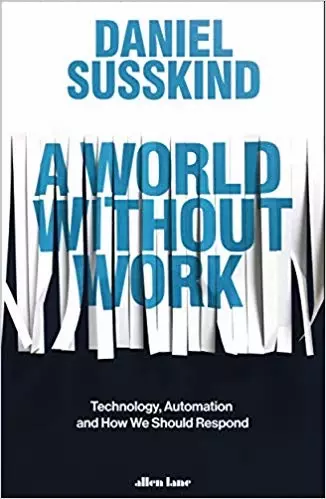A World Without Work
Peter Sloman
Right question, weak solution
Daniel Susskind raises the right question and sets the right agenda and direction of travel. Technology acting through automation does increase productivity and reduce working hours per unit of output. This will inevitably either vastly increase output, or vastly reduce employment and aggregate wage. It needs an urgent solution such as a basic income.
Susskind follows David Autor in distinguishing labour substituting and labour complementing aspects of automation. In fact, it’s the same phenomenon of increased productivity, only differentiated as to whether in early periods, the increased output is derived from the same labour, or in more developed economies, decreased labour produces the same output, either due to satiation or to ecological constraints.
His analysis of automation technology requires a more complete typology than his ‘purist/pragmatic’ divide. A useful hierarchy might be
- Mimicry of human techniques
- Simple full enumeration techniques, but by powerful machine processors
- Deterministic algorithms, such as Kantorovich’s linear programming solution
- One-pass heuristic algorithms, such as Clarke and Wright’s vehicle scheduling algorithm
- Iterative adaptive heuristic algorithms, the basis of current AI
These are not ‘pragmatic’ techniques, but the implementation of some form of logic. Susskind doesn’t refer to the extensive literature on philosophy of technology, which might suggest that deductive logic is objective. All approaches therefore explore this same objective logic, and cannot be distinguished as ‘pure’ or ‘pragmatic’. The same literature is more nuanced on the interaction of human agency and technology objectivity than Susskind is in airily declaring himself to be ‘not a technological determinist’ (p9). Our choices may very well be very tightly constrained, if not totally determined.
Susskind’s wide-ranging claims need deeper challenge. His claim that technology has created more bank employment misses the fact that 3,303 bank branches closed in the UK from 2015 to 2019 (p27). He makes the contradictory complaints that US big business fails to pay tax in Europe, and then that it does pay tax in Europe! (p178-9).
But he’s right that education to high skilled work is not a solution, and that it’s not the number of jobs, but personal incomes and aggregate macroeconomic wage which is the worry. The trail he doesn’t follow is that both lead to debt, and debt leads to crisis and austerity.
His discussion of basic income (UBI) is unfortunately shallow. He worries about a UBI work disincentive when it is clear that current welfare systems with their huge benefit withdrawal rates are major work disincentives compared to UBI. He underrates the gain in dignity, the increase in take-up, and the reduction in the administrative cost of UBI’s elimination of means-testing. And he proposes no alternative method to deliver income to citizens and aggregate demand to the economy as automation reduces both.
Membership of a UBI scheme would certainly need to be defined, but Susskind’s conditional ‘CBI’ based on ‘contribution’ is philosophically incorrect and practically unacceptable. The whole point is that technology can at least partially make goods and services available providentially, like air or rainfall. No labour contribution is therefore required to produce them, and none should be required to freely consume them. The practical implementation of his conditionality of contribution is horrendous, requiring an Orwellian ‘Political Power Oversight Authority…to watch over individuals as citizens in a society’ (p212,214).
UBI should be exactly as defined - universal and unconditional. It can be financed by sovereign money and would avoid the economic crisis and austerity created by technology-led reduction in earned incomes, which have then been supplemented by household and government debt.
Geoff Crocker
Editor ‘The Case for Universal Basic Income’
www.ubi.org

